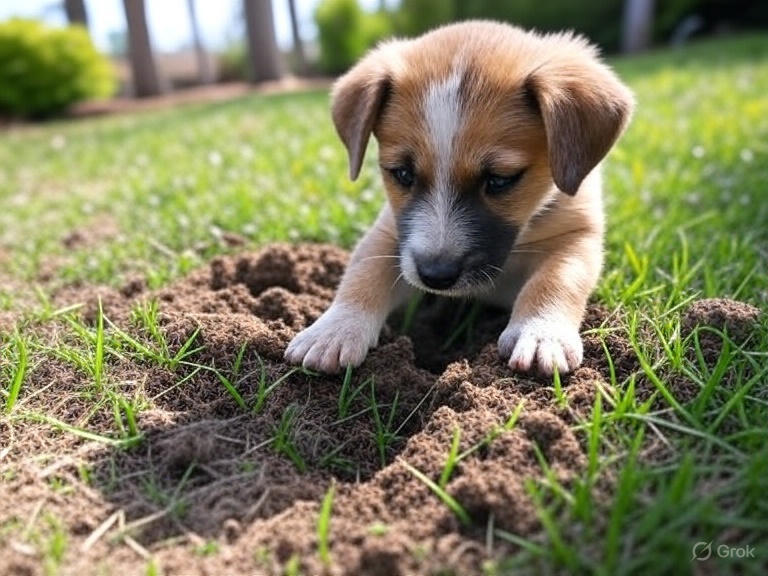
Digging is a natural behavior in dogs, especially in curious, energetic puppies. While it may be frustrating to find holes in your yard or garden, it’s important to understand why puppies dig before you can effectively and humanely stop the behavior. With the right approach, you can redirect their energy and protect your space—without punishment.
Why Do Puppies Dig?
Puppies dig for several reasons, most of which are instinctual or environmental:
- Exploration: Puppies are naturally curious. Digging is one way they explore new smells or textures in the soil.
- Entertainment and Boredom: If your puppy is left alone with little stimulation, they might dig as a form of play.
- Cooling Down: In hot weather, puppies may dig to create a cool spot to lie in.
- Hiding or Finding Treasures: Dogs often bury toys or treats to “save” them for later and may dig them up out of excitement.
- Instinct: Some breeds, like terriers or dachshunds, are genetically wired to dig due to their hunting ancestry.
- Anxiety or Stress: Puppies with separation anxiety may dig or become destructive when left alone.
How to Stop Digging Humanely
To manage and redirect your puppy’s digging behavior, follow these humane and positive strategies:
1. Provide More Physical and Mental Stimulation
A tired puppy is less likely to dig. Regular exercise, playtime, and mental stimulation reduce boredom and excess energy. Puzzle toys, scent games, and interactive play can keep your puppy busy and mentally satisfied.
2. Create a Designated Digging Area
If your puppy loves to dig, consider creating a “legal” digging zone. Fill a sandbox or small corner of your yard with loose soil or sand. Bury toys or treats for them to find. This not only satisfies their natural urge to dig but also keeps them away from off-limits areas like flower beds.
3. Supervise Outdoor Time
Keep an eye on your puppy when they’re outside. If you notice them starting to dig, gently interrupt the behavior by calling their name and redirecting them to a toy or activity. Reward them when they stop and engage in appropriate play.
4. Use Positive Reinforcement
Whenever your puppy plays without digging or stays away from previously dug-up areas, offer treats and praise. Positive reinforcement helps them associate good behavior with rewards, making them more likely to repeat it.
5. Avoid Harsh Punishment
Yelling, scolding, or using physical corrections will only confuse or frighten your puppy. These methods can damage your bond and may increase anxiety, which could lead to even more digging or destructive behaviors.
6. Address Separation Anxiety
If digging is accompanied by whining, pacing, or destructive chewing when you’re away, your puppy might be experiencing separation anxiety. In such cases, gradual crate training, calming toys, and desensitization routines can help. Consulting a professional trainer may be necessary for persistent issues.
7. Block Access to Tempting Spots
If your puppy repeatedly digs in the same area, consider blocking it temporarily using garden fencing, stones, or netting. This creates a physical boundary that discourages digging while you redirect their energy elsewhere.
8. Keep the Environment Cool and Comfortable
If your puppy is digging to stay cool, provide a shaded resting spot or cooling mat outdoors. In hot weather, always ensure fresh water and a cool place to relax.
When to Seek Help
If your puppy’s digging is obsessive or destructive despite your efforts, it may be time to consult a veterinarian or certified dog trainer. They can help rule out underlying behavioral or medical issues and offer tailored solutions.
Conclusion
Digging may be a natural behavior, but it doesn’t have to mean a torn-up yard or endless frustration. By understanding why puppies dig and using kind, consistent redirection, you can protect your outdoor space while keeping your puppy happy, safe, and engaged. Patience, positive reinforcement, and a little creativity go a long way in raising a well-behaved pup.
